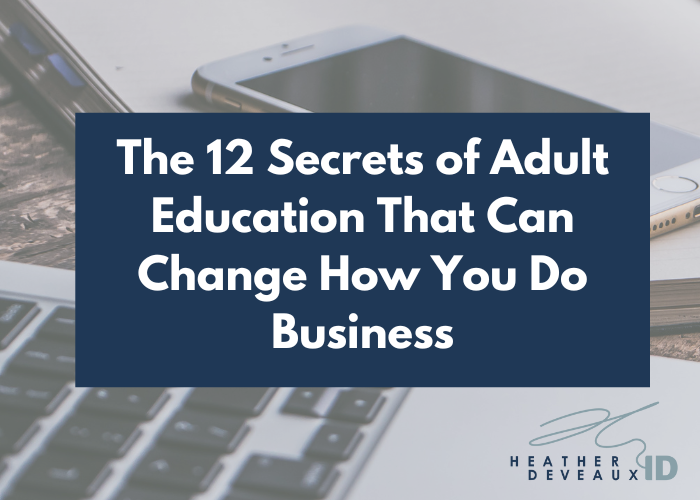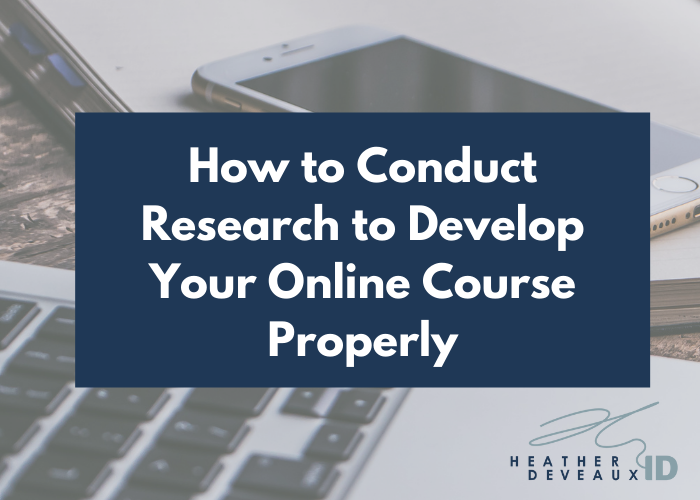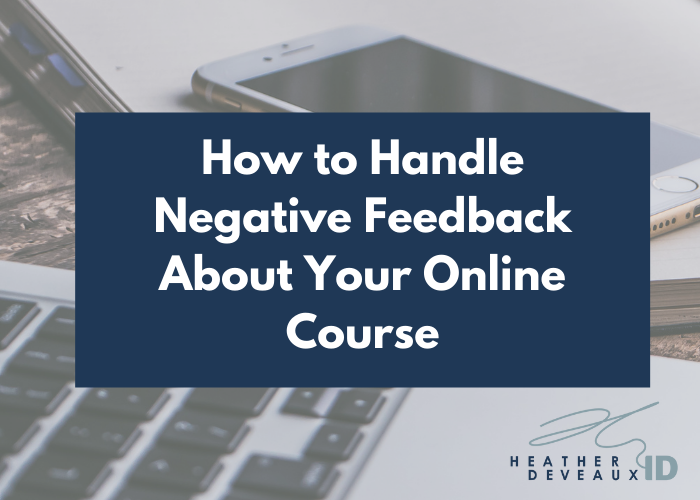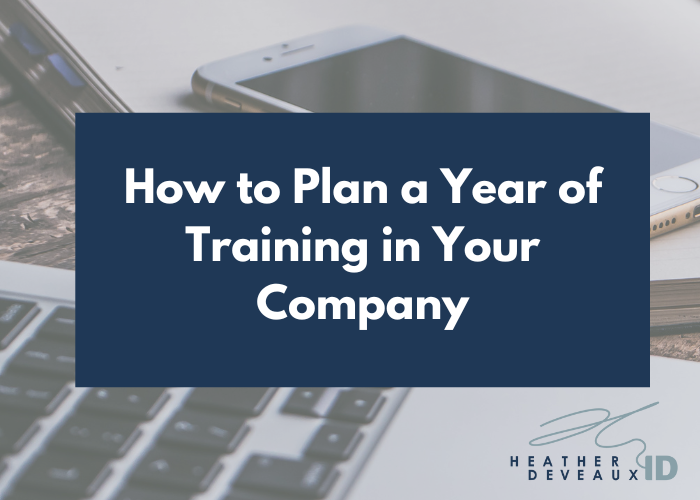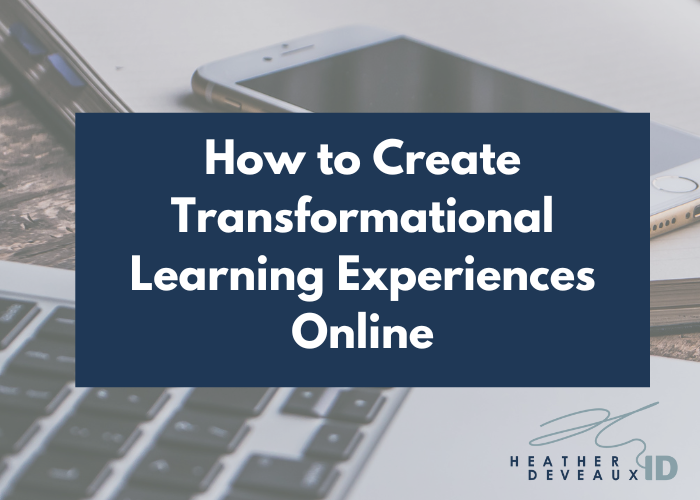The 12 Secrets of Adult Education That Can Change How You Do Business
The secrets of adult education are plentiful. I’m fascinated by the intersection of adult education and entrepreneurship. You might wonder what that has to do with online courses. The answer is simple: everything. When we talk about creating online courses, we’re usually referring to the act of actually selling online courses. When you search for how to create an online course, you’ll find hundreds, if not thousands of results telling you how to sell your online course.
Very few resources online are telling you how to create your online course. That’s because business has become all about selling. And rightly so: we can’t build businesses without sales. But when it comes to creating online courses, we can’t ask questions about selling until we’ve got something to sell. And that’s where the secrets of adult education come into play.
When you live, work and play in the digital business space the way I do, you come to learn a thing or two about how people view online courses.
First, most entrepreneurs see online courses as a quick path to earning passive income.
Second, many entrepreneurs I’ve talked to over the last few years have told me they “just want to have it on the shelf”. I don’t think people realize the work that goes into creating something like an online course and if they did, they’d never just stick it on the shelf.
And third, many entrepreneurs think that they’ll use their online course as a stepping stone to selling other, bigger, better (?) products to their customers.
And I’ll throw in one more for good measure: “everyone else has one.” An online course that is.

The Myths and Realities of Online Course Creation
Let’s work backward on these: no, not every business or entrepreneur has an online course. If that were true, I wouldn’t have a business because I create online courses for entrepreneurs.
Sure, you can use your online course as a stepping stone for bigger, better (?) products. But if you create an online course from an education perspective and not from a marketing perspective, you’d be surprised by just how big and better your online course could be. You might not even need another product to sell.
Investing time, money, and energy into a product just so you can forget about it is just bad business. I ask clients to rethink just putting an online course on the shelf. It costs thousands of dollars to have someone create a course for you. Why just let it collect dust?
And finally, but really first, creating an online course can earn you passive income, but not on day one. And not on day 365. It takes years to develop the kind of passive income people are talking about. Passive income is often mentioned in passing and in a dismissive way, but it’s an incredibly high-touch activity in the beginning.
I’m not saying that you shouldn’t create an online course. Hell, it’s literally what I do. And I’m not here to change your mind about wanting passive income. Maybe you do want something on the shelf to sell, or something that leads to more sales. What I want to do instead is to remind you that we’re talking about education here. E-D-U-C-A-T-I-O-N. You want to teach people something. They want to learn something. So let’s talk about online courses from an education perspective instead of a marketing perspective. I’m an educator, after all. What do I know about marketing? If we’re talking about business from an education perspective, it turns out, quite a bit.
Secrets of Adult Learning Principles at Work in Entrepreneurship
I first learned about adult learning principles back in 2005. I was studying adult education at the University of New Brunswick. Long, boring texts about how adults come to experiences made me want to bang my head against the wall. That’s because none of my professors were talking to me about adult education in practical terms. In other words, how do I use this information outside of a college classroom or corporate learning environment? It wasn’t until 2013 when I started studying at the Master’s level that I realized there are so many practical applications of adult learning in everyday life. In fact, I started to get really excited about the potential of these secrets of adult education in entrepreneurship and business.
In one of my favorite books on the topic of adult education, Jane Vella outlines 12 key adult learning principles. She illustrates that every learning experience needs to be draped on these principles. When you read through the principles through the lens of entrepreneurship, it becomes clear just how many applications exist. Especially when it comes to marketing. In fact, when I re-read her book, Learning to Listen, Learning to Teach in 2020, I realized that we could approach marketing through the lens of adult learning and hit the nail on the head every single time.
The 12 Principles of Adult Education
The Set-up
Principle #1: Needs Assessment: the engagement of learners (or customers) in naming what needs to be learned and what needs to be created. We do this all the time in business. And in creating online courses, the first step is to always find out what your learners (customers) need to learn from you. What’s the problem you’re trying to solve?
Principle #2: Safety: creating just the right environment for a learner/customer to come to the experience and get the most out of it. In marketing, we refer to this principle as “know/like/trust”. But what we’re really talking about is creating safe places for learners to make decisions.
Principle #3: Sound relationships: also part of the “know/like/trust” advice we often receive as entrepreneurs. Creating sound relationships means that everyone knows their role. And it’s clear what purpose each person has in coming to the experience.
The Lessons
Principle #4: Sequence: In what order does your learner/customer receive the information from you? When it comes to creating online courses, there is a natural progression of learning and understanding that has to happen. In marketing, we describe this as buyer readiness: is your buyer just learning about you now or ready to hit the buy button? In education (online courses), we refer to this as connecting previous experience to new experience.
Principle #5: Praxis: learning happens through reflection, action and iteration. Sound familiar? It should: many business accelerators pride themselves on teaching you how to iterate, but guess what: iteration is a term derived from adult education and the practical application of what we know to what we want to know, coupled with the influx of new information we gained from a series or experience or actions.
Principle #6: Respect for learners/customers as decision-makers: one of the key ingredients in adult learning is allowing adults to come to an experience as they are, and make room for them to learn at their own pace. When we think about marketing and selling online courses, we so often get caught up in trying to convince people we can help them that we don’t account for the fact that some customers don’t even know they need help yet.
The Purpose
Principle #7: Ideas, feelings and actions: learning requires many moving pieces and when creating online courses, we can’t just think about video scripts and worksheets. The more we do, the more we learn. In entrepreneurship, we come to learn that evoking emotions, encouraging ideas and having a bias toward action helps us succeed.
Principle #8: Immediacy: adult learners learn something new when they have a need. Customers buy when they have a need. You’ve got to be ready, willing, and able to help in either case.
Principle #9: Clear roles and role development: as adult learners AND customers in the world, entrepreneurs sometimes live in the gray. When you can clearly define your role – and your customer’s role – in your online course, or in your business for that matter, it becomes easier to know who to talk to and when…and how.
The Followthrough
Principle #10: Teamwork: you and your learner/customer – you’re a team. You’re working together, side-by-side or remotely, asynchronously, or at regular intervals to bring about a result. Whether you have a team in your business or not, remember that you don’t just serve your learners/customers, you work alongside them.
Principle #11: Engagement: obviously a very important piece of the puzzle, engagement is especially vital to a successful learning experience. Engagement is equally important in your business, and without it, you lose ground in gathering feedback, iterating, and growing.
Principle #12: Accountability: “how do they know they know?” is a common question adult educators ask when creating online courses or other educational materials. As entrepreneurs, we need to ask ourselves “how do we know we know?” when it comes to our products, services, and impact. It’s not just about showing up but offering something that does what we said it could do.
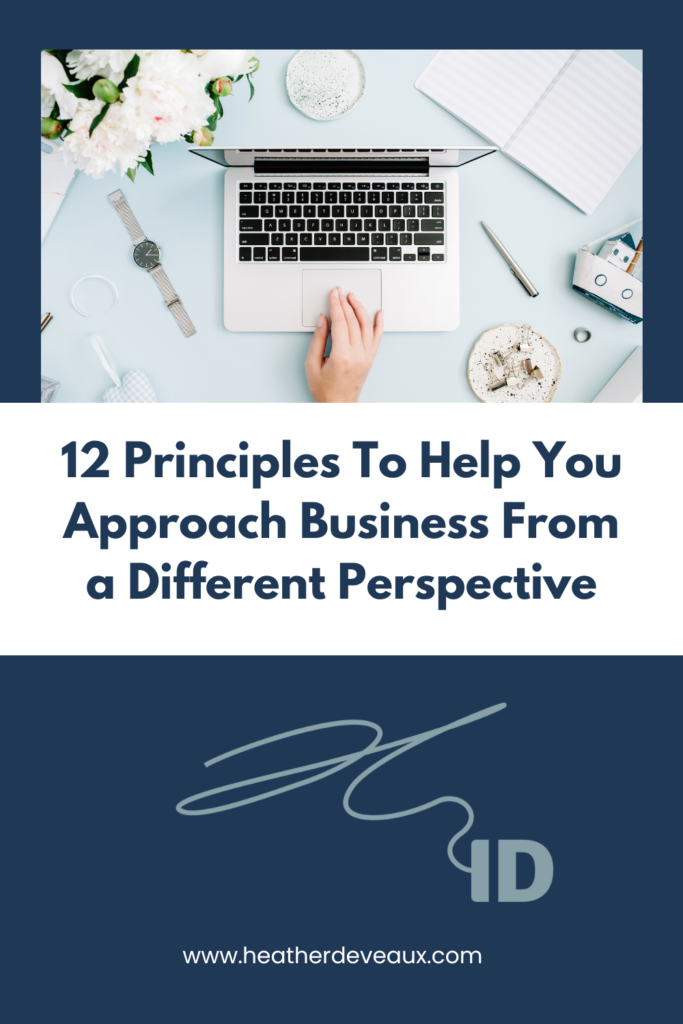
Adult Education and Entrepreneurship are One in the Same
Adult education is rooted in entrepreneurship. Entrepreneurship is rooted in the secrets of adult education. I call them the secrets of adult education because if you don’t live and play in the field of adult education, you might never consider this alternative viewpoint. I’m quoted on several occasions as saying that adult education is my secret weapon for business success.
Whichever side of the coin you happen to be on right now, remember that even though entrepreneurship is about creating something of value for the future, the decisions you make are rooted in the past. How we come to information, make meaning of it, and apply it is all based on how we interacted with the world yesterday. Adult education provides us a lens through which to make meaning of those experiences and come back to business with fresh eyes, knowing ourselves, our customers, and our businesses better than before.
Education vs. Business
I’m not here to convince you that an educational approach to business is superior to a marketing approach. I’m here to offer an alternative lens through the use of these secrets of adult education, to help you see that your work matters and is important enough to invest in. And to remind you that creating an online course is easy to get wrong.
A lot of entrepreneurs-turned-course-creators get it wrong. They focus far too much on how to sell the finished product instead of putting their efforts into creating the product first. And that’s fair: selling is what you do.
So why not take the pressure off of yourself to learn entirely new skills and find out how you can put a high-quality, learner-focused online course in the world without creating it yourself: book a call with me now.
I live at the intersection of education and business. Together, we can create an online course that you’d be proud to call your own. And when you’re proud of what you’ve got to sell, it’s easier to sell it.

